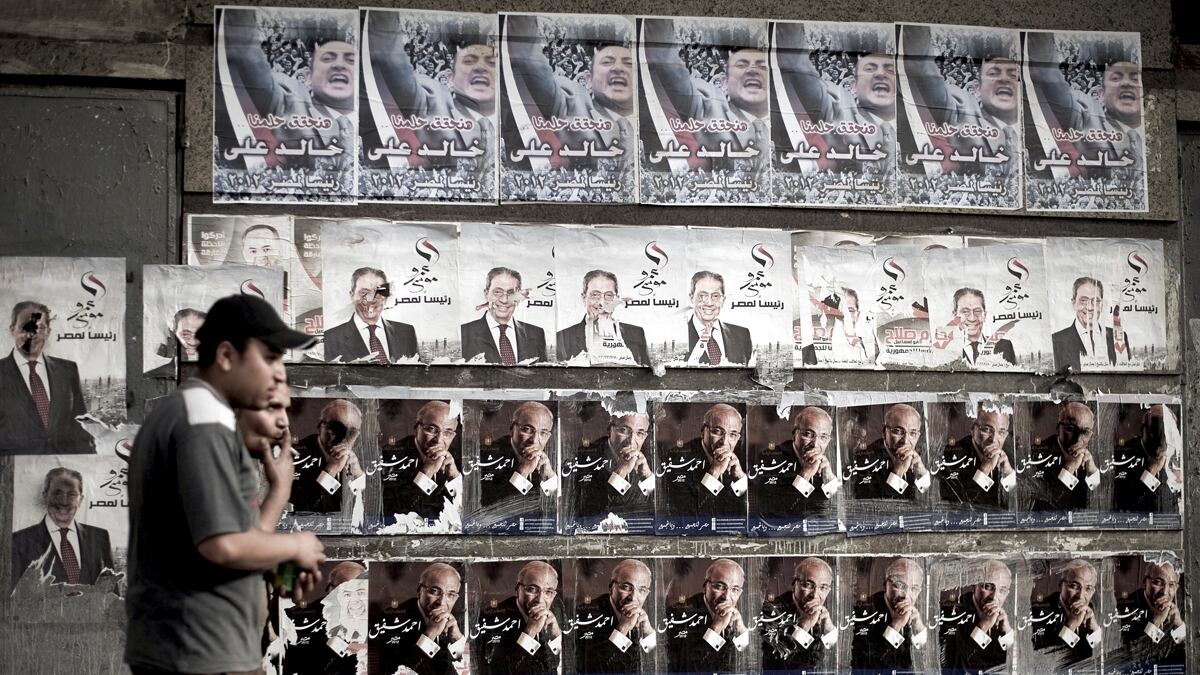On a square facing the Mediterranean in Egypt’s northern city of Alexandria, thousands of 20-somethings await the arrival of presidential candidate Abdel Moneim Abul Fotouh.
Official campaigning in Egypt’s first truly competitive presidential election, to be held on May 23, has just started. The mood at the gathering, which features mural painting and recitations of rap and poetry, is festive.
Under President Hosni Mubarak, there were no politics for students to practice, says Naima, a law student and campaign volunteer who is selling bright orange Abul Fotouh T-shirts, pins, and knapsacks. That’s why young Egyptians need to elect someone who supports the ideals of last year’s uprising, she says: “We need someone who gives us the freedom to speak.”
Abul Fotouh was long a vocal critic of the Mubarak regime and a moderate, senior member of the Islamist group the Muslim Brotherhood. He left the organization last year when the group disagreed with his decision to run for president.
The Brotherhood’s Freedom and Justice Party has since decided to field an official candidate, Mohammed Mursi. Other contenders in the elections include former Egyptian foreign minister and Arab League head Amr Moussa and Mubarak’s last prime minister, Ahmad Shafiq. Moussa, a liberal and a secularist, is the current frontrunner, but he is struggling to shed his ties to the former regime.
And no one here is willing to make predictions in a race that has already seen several twists and turns.
“It’s exciting, confusing, and no one knows what will happen at the end of the week, let alone the end of the month,” says blogger Zeinobia.

Three well-known candidates were eliminated from the race on technical grounds just last week, leading to sit-ins by one candidate’s supporters and bloody clashes.
Despite this and other unrest, the campaign season has opened. Nowadays, the faces of Egypt’s 13 presidential candidates fill posters, fliers, and advertising boards across the country. The first televised presidential debates will take place next week.
Egyptians are excited, but there is also great confusion and anxiety. The upcoming elections are the final, fraught act of a muddled transition process that still threatens to unravel.
An upcoming court ruling on the constitutionality of the parliamentary elections could dissolve the Islamist-dominated Parliament. That same Parliament has gone on strike, demanding the resignation of the current, military-appointed government. Most worrisome of all, Egypt’s new constitution, which will define the powers of the new president and the prerogatives of the Army, has yet to be written.
At the rally in Alexandria, the crowd listened to a star-studded line-up that included liberals and religious conservatives, from Google executive Wael Ghonim to the spokesman for the Salafist Al Nour party.
Supporters say this diversity is testimony to Abul Fotouh’s consensual politics and his ability to reach out to all Egyptians. “He is someone who unites, not divides,” says supporter Naima. His critics fear his moderate veneer hides more conservative views.
When Fotouh finally takes the stage, it is to fireworks and raucous applause. He promises to be “a civil servant, not a pharaoh” and asks the audience to help spread political awareness so that the country’s poor, “the victims of hunger and ignorance and oppression,” don’t sell their votes.
Like many of his competitors, Abul Fotouh pledges to restore security, develop the economy, and fight economic inequality.
Egyptians of all political persuasions and walks of life have grown increasingly unhappy with the way the council of elderly generals that has ruled the country since Mubarak’s ouster has mismanaged the transition. The police are unreformed, and lawlessness has spread; the economy is in free fall. Many fear the generals won’t surrender power to a civilian government before enshrining special prerogatives and privileges for themselves.
Human-rights activist Gamal Eid says he is concerned that “there is not another crisis or disaster, such as we’ve gotten used to under military rule, that gives the military leadership the excuse to intervene or to support one candidate.”
Since taking power last year, the Army has tried about 15,000 civilians in military courts. Meanwhile, the Army itself remains virtually unaccountable. A military court acquitted the Army doctor who carried out a so-called virginity test on protester Samira Ibrahim. Recently, the military leadership persuaded Parliament to pass a law giving it the right to determine what crimes fall under its jurisdiction, including any cases of corruption involving military figures.
And then there are worries about the electoral process itself. The commission supervising the elections has been appointed by the military, and its decisions cannot be appealed. Old and outdated voter lists have not been reviewed, says human-rights activist Ghada Shahbandar. These are all problems that came up during the parliamentary elections, but the authorities have refused to address them. “I’m very skeptical,” says Shahbandar. “I cannot assume good intentions on their behalf.”
Despite these misgivings, many Egyptians are hoping for the best. The optimistic, youthful crowd at the Abul Fotouh rally waves flags and chants: “Down with military rule!” and—one of the revolution’s slogans—“Bread, freedom, social justice!”
At a nearby library, Islam Al Ghazouli is running a voter education program, explaining the dizzying array of possible political outcomes.
“We’re doing a voter education program, and I have no clue who I’m going to vote for,” says the young man. “I’m confused, although I’m very interested in politics.” He gives the election a “50/50” chance of taking place. “It’s Egypt,” he says. “Expect the unexpected.”






